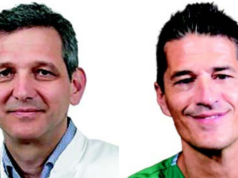
Late-breaking trial data has demonstrated improved progression-free survival in patients with metastatic colorectal cancer after treatment with TheraSphere Y-90 Glass Microspheres (Boston Scientific).
Findings from the EPOCH clinical trial, which were presented at the European Society for Medical Oncology (ESMO) Congress 2021 and are to be published in the Journal of Clinical Oncology, showed that the TheraSphere treatment met both its primary endpoints, including progression-free survival (PFS) and hepatic progression-free survival (hPFS) of patients with metastatic colorectal cancer (mCRC) of the liver.
In the trial, TheraSphere treatment—a selective internal radiation therapy (SIRT) comprised of microscopic glass beads containing radioactive yttrium (Y-90) that are specifically delivered to target tumors—was used as a second-line treatment in combination with standard of care systemic chemotherapy (SOC) for patients who had disease progression during or after first-line chemotherapy.
Riad Salem, interventional radiologist at Northwestern Memorial Hospital (Chicago, USA) and co-principal investigator of the trial, said: “The EPOCH trial not only demonstrated positive safety and efficacy data for the patients treated in this study, but underscores the success of integrating a device-based therapy like TheraSphere treatment in the continuum of care with systemic chemotherapy and biologic regimens, thereby providing the rationale and setting the stage for future investigation in other cancer types.”
Peter Pattison, president, Interventional Oncology, Peripheral Interventions at Boston Scientific, added: “EPOCH is the first positive phase 3 SIRT trial in any disease setting and the data is expected to support our regulatory submission to the US Food and Drug Administration (FDA), with the hope that more patients with liver dominant mCRC will gain access to TheraSphere as a treatment option in the future.”
The global, prospective EPOCH pivotal clinical trial is a phase 3 study, designed to assess therapeutic benefit compared to SOC, which randomized 428 patients with mCRC to second line chemotherapy, with or without the addition of TheraSphere treatment. Both primary endpoints were met and included progression-free survival and hepatic progression-free survival, which reflect how long patients live without the disease progressing further, both systemically and within the liver.
The addition of TheraSphere treatment significantly increased both PFS (p=0.0013) and hPFS (p<0.0001). Patients receiving TheraSphere treatment with second-line chemotherapy were 31% less likely to show disease progression or death (HR= 0.69) and 41% less likely to show hepatic disease progression or death versus with chemotherapy alone (HR= 0.59).
Mary Mulcahy, medical oncologist at Northwestern Memorial Hospital and co-principal investigator of the trial, commented: “In the second line of therapy for metastatic colorectal cancer, with disease isolated to the liver, the addition of TheraSphere with chemotherapy resulted in a significant delay in overall tumor progression. Additionally, chemotherapy-related adverse events were comparable between the trial arms.”
Earlier this year, the FDA approved TheraSphere for the treatment of unresectable hepatocellular carcinoma (HCC) and granted breakthrough device designation for expedited review as a treatment of patients with glioblastoma. In the USA, the use of TheraSphere for mCRC is for investigational use only as the safety and effectiveness have not been established, say Boston Scientific.












